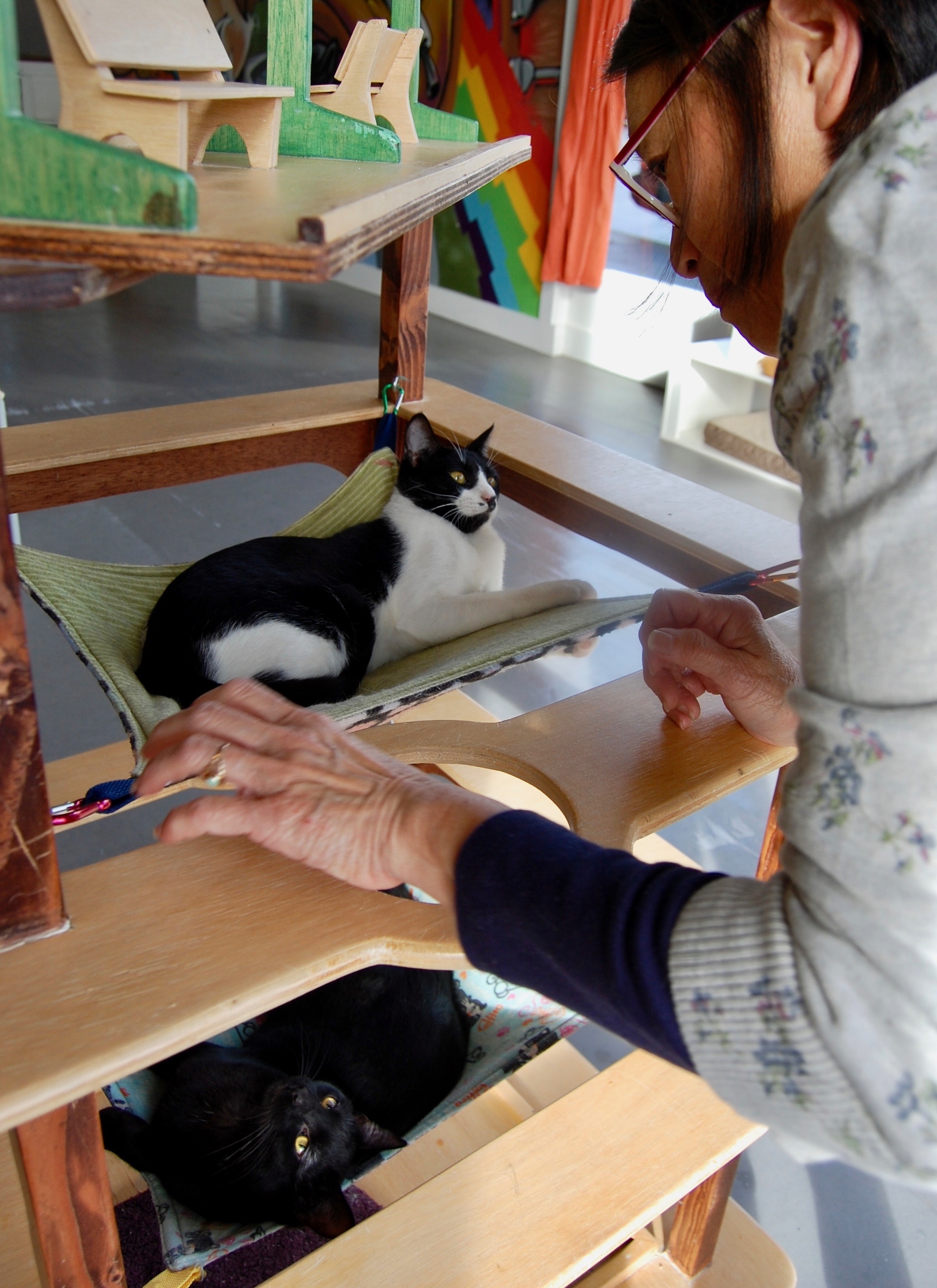Volunteer of the Month: Mae L.
Mae L. is a rock star volunteer who always steps up wherever needed. Not only does she train our volunteers to socialize our hardest to place cats, she’s also an Adoption Center counselor connecting cats and families. And when odds and ends come up, Mae is always there to help with painting projects, medical tasks, and even recently caring for special-needs cat Didi while her foster was out of town.
I talked with Mae about her first cat — a foster fail — and how volunteering has brought her joy and fulfillment in her retirement years.
Like many of our volunteers, Mae uses play to help cats build confidence. Photo by Cathy Niland.
Larissa C.: How did you get involved with Cat Town?
Mae L.: I retired from a career as a nurse at the end of 2015 and was looking for volunteer opportunities. I wanted to spend some of my time with animals and learned about Cat Town from my neighbor, Dawn. The concept of the café and cat adoption and emphasis on under-socialized cats motivated me to check it out. The rest is history!!
LC: Have you been a cat person your whole life?
ML: I’ve always had an interest in animals. Growing up we had fish, and I had a rat and turtles as pets after I left home. At one point, I considered training to be a vet. My introduction to cats was with roommates in NYC. When they decided to take a cross-country road trip, I became the foster mom and brought Yorty with me when I returned to California—I was a foster fail!
Yorty was my first cat. She was a sweetie and lived 22 years. I then took on a kitten who was found in a cemetery. Mi-me was an independent tortie who only warmed up to laps and pets in her later years. I brought in Tangerine, an orange tabby, to see if he could help Mi-me socialize. He was a big love — all my friends wanted to interact with him whenever they came over.
“Cats can be very individual in their personalities—one of their endearing characteristics. The socialization process can be equally individual—what works for one might not work for another—a connection with one volunteer might not be the same for another.”
LC: Do you have cats at home?
ML: I currently have Shitake and Bamboo—a bonded pair from Oakland Animal Services. Shitake is a big, black, friendly snack vacuum. Bamboo is an orange tabby who is shy with most people, but is on a slow track to learning people can provide pets.
LC: What role do you play, or have you played, at Cat Town?
ML: I am an adoption counselor for the Cat Zone. I volunteer and train Studio volunteers. I am also a case manager [Editor’s Note: Cat Town’s volunteer Case Managers help ensure our cats have successful transitions in their new homes].
Mae helping some of our older shelter kittens socialize in our Adoption Center. Photo by Cathy Niland.
LC: What do you love most about volunteering?
ML: Since retirement, it has been a bit of a challenge to find productive use for my extra free time. Volunteering brings me satisfaction in that it fulfills my need to be active in something that is valuable and caring. I also enjoy “working” with people of different ages and backgrounds who have an affinity for cats in common. Seeing our special cats progress and find a forever or foster home is a great reward!
LC: Working with vulnerable shelter cats takes time and patience. What other qualities do you think makes for a good Cat Town volunteer?
ML: Depends on your specific volunteer role. As an adoption counselor or Cat Zone volunteer, it is important to feel comfortable engaging with people. For example, we have all covered a shift when the cats are not very active or interactive. To provide a positive visit to guests, it’s important to talk with them about Cat Town’s history and mission, their interest in cats, answer any questions they have, etc. As a Studio volunteer, you should be willing to make and read notes of other volunteers. To optimize the time we spend with each cat, it is important to build on the work of each other to speed the socialization process. It’s all depends on what you’re interested in.
LC: What is something you’ve learned about under-socialized cats during your time at Cat Town that you think people wouldn’t expect to be true?
ML: Cats can be very individual in their personalities—one of their endearing characteristics. The socialization process can be equally individual—what works for one might not work for another—a connection with one volunteer might not be the same for another. It is a process, but by no means a canned process. Also, environment is a big factor in the socialization process—the space in terms of size, comforts, configuration supports the process.
LC: Why would you encourage people to adopt a Cat Town cat?
ML: It’s a WIN-WIN-WIN!!!
WIN #1: As an adopter, you develop an especially strong bond by working to transition an under-socialized cat to your home. You’re invested and should feel proud of the success.
WIN #2: An under-socialized cat blossoms and finds a good home—a fate not available to all under-socialized cats.
WIN #3: Cat Town’s work and mission is supported and continues!
To celebrate her birthday, Mae is sponsoring Buffy’s adoption fee, with the hope she finds her family in September. Photo by Cathy Niland.
If you want to be part of the team that’s helping save Oakland’s at-risk and under-socialized cats, get started by completing a volunteer application form. We’re always looking for new volunteers!
Back to the Cat Town Blog.



